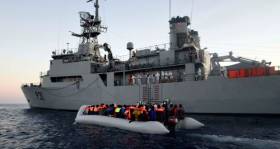Displaying items by tag: No patrols
Naval Service Vessels Will Not Patrol Mediterranean Sea
A number of Irish Naval Service vessels, RTE reports, will not be able to patrol the Mediterranean Sea to assist with the rescue of migrants, the Taoiseach has told the Dáil.
Leo Varadkar said that as three Irish naval vessels are in operational reserve or undergoing maintenance, the navy's operations will be restricted.
Confirming that the Irish Navy will not be in a position to return to the Mediterranean he said: "We will have to focus on our seas and on fishery protection and drug interdiction instead."
Responding to questions from Sinn Féin leader Mary Lou McDonald, Mr Varadkar said: "Those vessels will be out of service until mid-September and late October. But with current staffing levels it is unlikely they will be brought back into service. So that means three ships will be held in operational reserve or in maintenance with the remaining six vessels fully operational.
"It does mean that some operations will be restricted, for example the naval service will not be able to return to the Mediterranean because we will have to focus on our seas and on fishery protection and drug interdiction instead."
For more including the Taoiseach and response from political opposition click here.






























































